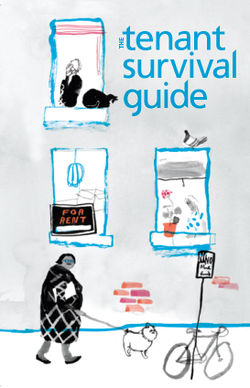Difference between revisions of "Tenant Survival Guide"
Jump to navigation
Jump to search

Nate Russell (talk | contribs) |
Nate Russell (talk | contribs) |
||
| Line 61: | Line 61: | ||
<noinclude>__NOGLOSSARY__</noinclude> | <noinclude>__NOGLOSSARY__</noinclude> | ||
[[Category:Navigation Page]] | [[Category:Navigation Page]] | ||
[[Category:Tenant Survival Guide]] | |||
Revision as of 00:53, 20 February 2014
|
|
This is a Clicklaw Wikibook, a collaborative, plain language legal publication that is updated as a wiki and can be printed or downloaded. |
|
|
Download the full wikibook in PDF (Feb 2014). |
|
|
Download the full wikibook in EPUB (Feb 2014). Learn more about EPUBs. |
The Tenant Survival Guide is intended to give tenants a basic understanding of residential tenancy law in British Columbia and what it means to them. The Guide is produced by the Tenant Resource & Advisory Centre, an educational organization promoting tenants' rights and affordable housing in British Columbia.
Contents
- Introduction
- Before Renting
- Making Your Agreement
- Condition Inspection Reports
- Security Deposits and Additional Fees
- Repairs and Services
- Rent Increases
- Privacy & Quiet Enjoyment
- Evictions
- Moving Out
- Dispute Resolution
- Taking Action
- Other Resources for Tenants
About this Guide
The Tenant Survival Guide is produced by TRAC Tenant Resource & Advisory Centre and is intended to give tenants a basic understanding of residential tenancy law in British Columbia and what it means to them. Learn more about this Guide.
About TRAC, the Tenant Resource & Advisory Centre
The Tenant Resource & Advisory Centre is an educational organization promoting tenants' rights and affordable housing in British Columbia.
- Tenant Infoline
- 1-604-255-0546
- Toll-free: 1-800-665-1185
- Website: tenants.bc.ca
Add feedback. Help us improve this page.
